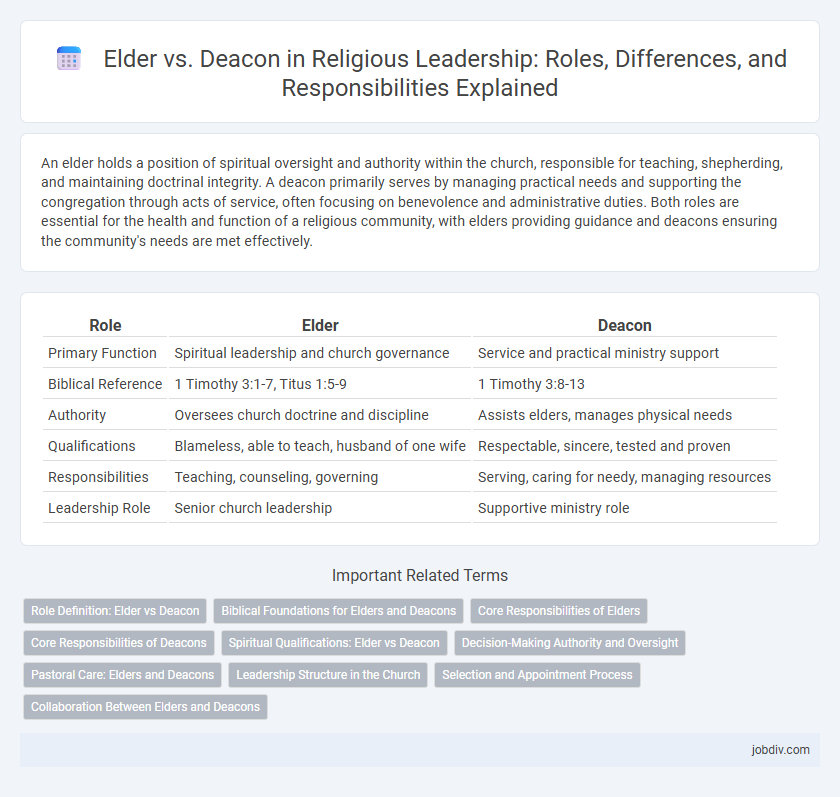An elder holds a position of spiritual oversight and authority within the church, responsible for teaching, shepherding, and maintaining doctrinal integrity. A deacon primarily serves by managing practical needs and supporting the congregation through acts of service, often focusing on benevolence and administrative duties. Both roles are essential for the health and function of a religious community, with elders providing guidance and deacons ensuring the community's needs are met effectively.
Table of Comparison
| Role | Elder | Deacon |
|---|---|---|
| Primary Function | Spiritual leadership and church governance | Service and practical ministry support |
| Biblical Reference | 1 Timothy 3:1-7, Titus 1:5-9 | 1 Timothy 3:8-13 |
| Authority | Oversees church doctrine and discipline | Assists elders, manages physical needs |
| Qualifications | Blameless, able to teach, husband of one wife | Respectable, sincere, tested and proven |
| Responsibilities | Teaching, counseling, governing | Serving, caring for needy, managing resources |
| Leadership Role | Senior church leadership | Supportive ministry role |
Role Definition: Elder vs Deacon
Elders serve as spiritual overseers and shepherds in the church, providing doctrinal guidance, pastoral care, and leadership in worship and church discipline. Deacons primarily fulfill practical roles, managing church needs such as charity, administration, and service to the congregation. The distinction between elders and deacons lies in the elders' authoritative governance and teaching responsibilities versus the deacons' focus on service and support functions.
Biblical Foundations for Elders and Deacons
Elders and deacons are distinct offices established in the New Testament, each with specific biblical foundations and responsibilities; elders are primarily charged with spiritual oversight, teaching, and shepherding the church as outlined in 1 Timothy 3:1-7 and Titus 1:5-9. Deacons serve by managing practical and service-oriented duties, ensuring the needs of the congregation are met, as described in 1 Timothy 3:8-13. The biblical qualifications for both roles emphasize character, faith, and family leadership, reflecting their complementary functions within church governance.
Core Responsibilities of Elders
Elders hold the primary responsibility for spiritual oversight, including preaching, teaching doctrine, and shepherding the congregation to ensure sound faith and moral integrity. They provide pastoral care, discipline within the church, and lead in prayer and administration, embodying servant leadership rooted in biblical qualifications. Unlike deacons, whose role centers on practical service and ministry logistics, elders prioritize governance and spiritual maturity in the community.
Core Responsibilities of Deacons
Deacons primarily serve by managing the practical and logistical needs of the church, including assisting with charity, administering church finances, and supporting worship services. They act as a bridge between the congregation and church leadership, ensuring that the community's physical and spiritual needs are met. Unlike elders who focus on teaching and spiritual oversight, deacons emphasize service and operational support within the church body.
Spiritual Qualifications: Elder vs Deacon
Elders are required to demonstrate mature spiritual leadership, exhibiting qualities such as being above reproach, self-controlled, and able to teach Scripture effectively. Deacons must display integrity, sincerity, and a servant's heart, managing practical ministries with faithfulness and humility. Both roles demand a strong personal faith and commitment to Christ's teachings, but elders carry the added responsibility of shepherding the congregation's spiritual growth.
Decision-Making Authority and Oversight
Elders hold primary decision-making authority in church governance, responsible for spiritual oversight, doctrinal integrity, and guiding the congregation's direction. Deacons assist by managing practical needs and service-oriented tasks but typically do not participate in authoritative decisions or discipline matters. The distinction ensures elders provide leadership and accountability while deacons support operational functions within the church community.
Pastoral Care: Elders and Deacons
Elders primarily provide spiritual guidance, counseling, and oversight within the church, ensuring the congregation's doctrinal integrity and pastoral well-being. Deacons focus on serving the practical needs of the church community, such as assisting with charitable works, managing church resources, and supporting elders in ministry tasks. Both roles complement each other to foster holistic pastoral care, addressing both spiritual and physical needs of church members.
Leadership Structure in the Church
Elders serve as spiritual overseers and primary leaders within the church, responsible for teaching, shepherding, and maintaining doctrinal purity, whereas deacons focus on practical service and assisting in the logistical needs of the congregation. The leadership structure typically places elders in authoritative roles involving governance and decision-making, while deacons support by managing charitable activities, hospitality, and administrative tasks. This division of roles ensures balanced leadership that addresses both spiritual guidance and operational support in church ministry.
Selection and Appointment Process
The selection and appointment process for elders typically involves a thorough evaluation of spiritual maturity, doctrinal soundness, and leadership abilities by existing church leadership or a governing body. Deacons are often chosen based on their demonstrated service, practical skills, and commitment to the congregation's welfare, with appointment confirmed through congregational approval or church elders' endorsement. Both roles require prayerful consideration and adherence to scriptural qualifications outlined in passages such as 1 Timothy 3 and Titus 1.
Collaboration Between Elders and Deacons
Elders and deacons collaborate by fulfilling distinct yet complementary roles within church leadership, where elders primarily focus on spiritual oversight and teaching, while deacons manage practical and service-oriented responsibilities. This cooperation enhances church governance, ensuring both the spiritual well-being and operational needs of the congregation are met effectively. Shared communication and mutual respect between elders and deacons foster unity and strengthen the overall ministry impact.
Elder vs Deacon Infographic

 jobdiv.com
jobdiv.com